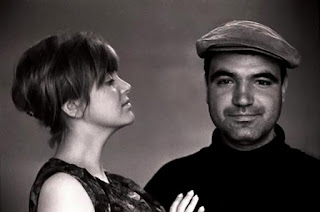 |
| Tom Luddy |
My friend and long-time mentor in film arts Tom Luddy is receiving the coveted Mel Novikoff Award st the SF Film Festival on April 9 at the Castro Theater in San Francisco. Luddy, a co-director of the Telluride Film Festival, has been associated with American Zoetrope since 1979. Join SFFILM Festival for this program (4 PM) featuring a conversation with Tom followed by Tom's choice of two films: a rarely screened Godard short and Gennady Shpalikov's landmark A Long and Happy Life (1966).
Gennady Shpalikov's A Long Happy Life (1966)
 |
| Kiril Lavrov and Inna Gulaya in A Long and Happy Life |
In the history of Russian, perhaps, even European auteur cinema, “A Long Happy Life” (1966) is unique. Now a classic, this autumnal drama of love and disenchantment (with strong autobiographical overtones) marks the debut of Gennady Shpalikov’s career as director. It also marks its end. Acclaimed abroad but barely appreciated in Russia, he was never allowed to direct another film, even though he continued to write for the screen until his suicide in 1974 at the age of thirty-seven.
 |
| Inna Gulaya and Gennady Spalikov |
The film begins on a fall Saturday, at dusk at a construction site outside Novosibirsk. A group of young men and women – the beautiful Lena (Inna Gulaya, Shpalikov's wife) among them – are boarding a factory bus at dusk for a long ride to the big city to catch the Moscow Art Theatre production of Anton Chekhov’s The Cherry Orchard. Half-way there and after night fall, they pick up a hitch-hiker Victor (Kirill Lavrov), who takes the seat next to Lena. A geologist with a roving eye, Victor, who is in his early thirties, is making his way home in European Russia; Lena, in her early twenties, is beautiful, naïve, and dreamy.
 |
| Inna Gulaya in A Long and Happy Life |
They “click.” Before long, they exchange confidences about their childhoods. Lena remembers her heart break from a crush on a fireman; her flashback is the film’s first homage to Jean Vigo’s “L’Atalante.”
 |
| A Long and Happy Life |
 |
| Jean Vigo, L'Atalante (1934) |
What began as a bus ride flirtation ascends to dizzying heights in the theater. Emotions swell against the dialogue of the two last acts of Chekhov’s play and intensify in the intermission, set up as a social mixer, replete with drinks and dancing in the foyer. Unable to resist, the two soon retreat into the dark recesses of the theater house and begin to kiss.
But it is not their embraces but their dialogue after they leave the theater that marks the emotional high point of their relationship: poetic chatter of a young couple in love, interspersed with mutual declarations of undying love and everlasting loyalty.
What follows is a painful denouement terminating in a drawn-out coda (another tribute to Vigo’s Le Chaland qui passé, a.k.a., L'Atalante): a barge floating down the great Siberian river Ob. The film's soundtrack (composer Vyacheslav Ovchinnkov) ends on a pure accordion melody, reminiscent of L’Atalante’s closing tune.
 |
| Elena Chernaya, A Long and Happy Life |
Like all gifted artists, Shpalikov was in a dialogue with his great predecessors and contemporaries. An admirer of Jean Vigo’s L’Atalante he turns Vigo's cinematic fairy tale about simple bargemen who live happily ever after into its opposite—a Chekhovian drama about the solipsism and narcissism of modern characters, amplified in the infinite echo chamber of the vast Eurasian plain.
A poet, Shpalikov, not unlike like Cocteau or Pasolini, was a master of subtle moods and resonances that fill the soul in moments of erotic intoxication or despair. A consummate master of monochromatic chiaroscuro, cinematographer Dmitry Meskhiev brought this poetry to life, encouraging the director to develop his own script, originally an ordinary melodrama, into a powerful existential cinema.
By grafting Chekhov’s pessimism onto sunny and irreverent Vigo and setting his action in the haunting dusk and darkness of Siberia, Shpalikov seems to have also produced a Russian take on the archetypal road film, Fellini’s La Strada, with his wife Inna Gulaya assuming the role of Gelsomina—in her husband's art, as in life (she is rumored to have died of an overdose in 1990).
 |
| Lena's childhood flashback. A Long and Happy Life. |
 |
| Gelsomina (Giulietta Masina) in La Strada |
For many in Russia, A Long and Happy Life marked the closure of the 'Thaw" cinema that flourished in the Soviet Union during the years of reform following Stalin's death.
* * *
Plays with Une bonne à tout faire (Jean-Luc Godard, 8 min, 1981/2006), a rare short filmed at Coppola’s American Zoetrope and revolving around a tableau vivant of a Georges de La Tour painting.
Not to be missed!
— Grisha Freidin
For tickets, click here.






